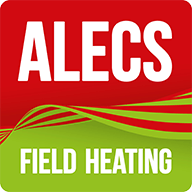The benefits of electric field heating
- Up to 40% savings on operational costs
- Low energy consumption
- Runs on sustainably generated electric power
- Even heating distribution
- It takes a very short time to heat up
- Easy control from a distance (via pc, tablet and smartphone)
- Return on investment is clear beforehand
- Has no effect on the drainage system
- No storage of gas and oil
- No emissions of combustibles
- Low-noise
- Fast and easy installation (also below existing artificial pitches)
- Almost maintenance free
- For the use below natural grass, artificial grass, gravel, asphalt, stone and synthetics
- Use only when necessary
10 year guarantee
A 10 year guarantee is given with our electric heating systems. Alecs Field Heating is the only company in the world that installs electric heating systems for sports fields on a large scale and issues such guarantees with it. A reliable heating system is one thing less to worry about for many sports clubs. After all, it is not only annoying to have to cancel matches and trainings due to frost and/or snowfall, but more and more sports associations have started to impose substantial fines to clubs which have fields that cannot be played on year-round.
User friendly software
Alecs Field Heating developed software that lets the heating system function as optimal as possible. This software is highly user-friendly and can be operated all over the world via PC, laptop, tablet and smartphone. By linking this software to the heating system, we can guarantee a return in energy consumption of up to 40 percent!
Electric heating vs. conventional systems
Heating systems of Alecs Field Heating make optimal use of sustainably generated energy. In contrast to conventional heating systems, which need warm water. This water is usually heated by burning oil and gas. Our heating systems offer many benefits in respect of conventional systems. We have listed the 5 most important benefits for you:
Conventional heating
- Fast heating up/defrosting cycle
- Uneven heating distribution
- High energy consumption/cost
- High maintenance cost
- Environmentally harmful
Electric heating
- Slow heating up/defrosting cycle
- Even heat distribution
- Low energy consumption/cost
- Low maintenance cost
- Environmentallyfriendly
